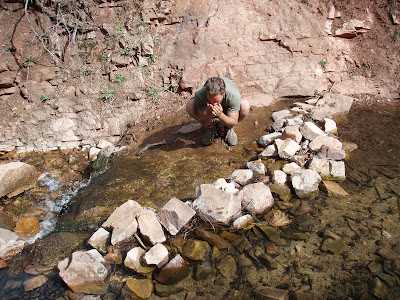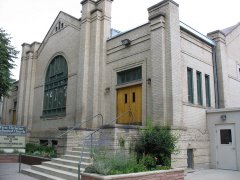Others, however, have not been quite so sure. In a recent conversation, someone had the courage to suggest what many of us may have thought--that perhaps it was too soon to offer forgiveness, that maybe doing so trivialized what was, by all accounts, a very terrible wrong, or that doing so may have rushed a grief process in which anger would have played an important role.
These are all legitimate concerns--but I think they may stem from a misunderstanding of forgiveness. So a few thoughts today on what forgiveness does--and does not--involve.**
- Forgiveness is not a one time event. The individuals affected by Sunday's shootings declared their forgiveness almost immediately. However, it will take time for them to grow into this declaration. As I mentioned in a sermon on this topic last month, they will have to forgive--to make moves against their anger--again, and again, and again (seventy times seven!). I suspect that for some of these people (perhaps all of them) it will take years for forgiveness to be complete. As Smedes says, "Forgiving is a journey; the deeper the wound, the longer the journey."
- Forgiveness does not mean condoning or excusing a wrong. In fact, forgiveness means the opposite. To forgive someone of a wrong, you must acknowledge that there is actually a wrong to be forgiving. To forgive, you must assign blame. When we forgive, we are not saying that the intolerable has suddenly become tolerable. Rather, we are saying that the only way we can deal with an intolerable wrong is through the miracle of forgiveness.
- Forgiveness does not mean minimizing a wrong. Saying "I forgive you" is not the same thing as saying, "That's okay--it was no big deal." If it's not a big deal, it doesn't need to be forgiven. As Lewis Smedes has written somewhere, "We need to sort out our hurts and learn the difference between those that call for the miracle of forgiveness and those that can be borne with a sense of humor. If we lump all our hurts together and prescribe forgiveness for all of them, we turn the art of forgiving into something cheap and commonplace. Like good wine, forgiving must be preserved for the right occasion.”
- Forgiveness is not the same thing as reconciliation. Reconciliation may be seen as the ultimate (though not always attainable) goal of forgiveness. However, forgiveness is only one step in achieving this goal. For full reconciliation to occur, the person who committed the wrong must also make a move--must "repent" in the biblical sense of the word (express both sorrow AND a commitment to change). If the person who committed the wrong has not changed, it would be unwise--even foolish--to enter back into relationship with them. In short, it takes one person to forgive but two to achieve full reconciliation.
- Forgiveness does not mean there are no consequences. God (and good parents, I think) may forgive the sins of His children but deem it important for them to live with the consequences of their poor choices. Sometimes when we forgive people, it is also necessary that they live with painful consequences. This can be an important a way of protecting ourselves from future hurts.
- Forgiveness does not mean forgetting: Forgiveness has more to do with the way we remember than with removing our memories. When we forgive, we learn to remember without anger or a desire for revenge. Furthermore, in a sin filled world, remembering the wrong we've forgiven can be important because of the need to protect ourselves from future hurts.
- Forgiveness is not something we only do for other people: Scripture makes clear that forgiveness is one of the ways we show Christ-like love for other people. However, it's also a way we love ourselves. When we refuse to forgive, we are held captive by our own anger and bitterness--it eats away at us and threatens to consume us. As Smedes writes: "When we forgive, we set a prisoner free and discover that the prisoner we set free is us."
*It says something about the nature of forgiveness that it is considered newsworthy event. **Many of these come from Lewis Smedes' excellent book, The Art of Forgiving.





















